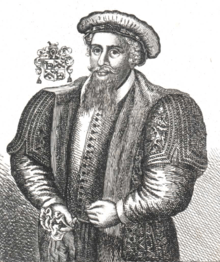Mark Ridley (physician)

Dr Mark Ridley (1560 – c. 1624) was an English physician and lexicographer, born in Stretham, Cambridgeshire, to Lancelot Ridley.[1][2] He became physician to the English merchants in Russia, and then personal physician to the Tsar of Russia.[3] While living in Russia between 1594 and 1599, he compiled two manuscript dictionaries of Russian, a Russian-English dictionary with 7,203 entries entitled A dictionarie of the vulgar Russe tongue and an English-Russian dictionary with 8,113 entries entitled A dictionarie of the Englishe before the vulger Russe tonnge. The Russian-English dictionary includes a short grammar of Russian on the first eight folios. Both dictionaries are now held at the Bodleian Library at the University of Oxford (MSS Laud misc. 47a and 47b). After his return from Russia he also wrote two books on magnetism.
Whilst Ridley's Russian dictionaries are more original, he is best known as an innovative follower of Dr William Gilbert (1544–1603) and the magnetic science that Gilbert published in his De Magnete of 1600. Until Gilbert's death in 1603 Ridley had lodged with him in Wingfield House, London. In 1613 Ridley published his Magneticall Bodies and Motions, the first printed work in English to promote Gilbert's ideas. Ridley was attacked by the conservative Revd William Barlow, for advancing Gilbert's Copernican astronomy and also, in Barlow's opinion, for plagiarizing his own version in English of Gilbert's magnetic science.
Ridley's Russian dictionary
The dictionary's primary significance is in recording spoken Russian language of that era: the written language differed considerably in its vocabulary and grammar under the strong influence literary tradition of the Orthodox church texts. Thus dictionaries compiled by foreign visitors who came to Russia for business reflected the actual Russian language use that they learned through daily interaction. Whereas the written tradition can be studied using a multitude of preserved texts, the contribution of the spoken language can be studied through the records of foreign visitors who were not influenced by local stylistic and other constraints and recorded the language as it was spoken.
This thesis was realized in the works of Prof. B. A. Larin (1937, 1948, 1959) and others. The manuscript of the Ridley dictionary was originally reviewed by Simmons and Unbegaun (1951, 1962), Unbegaun (1963) from Oxford University, and later studied by a team of scholars from Kazan State University in Russia (Galiullin & Zagidullin, 1996, 1997). The manuscript was published in 1996 under the title A Dictionarie of the Vulgar Russe Tonge: attributed to Mark Ridley / edited from the late-sixteenth-century manuscripts and with an introduction by Gerald Stone by Bohlau Verlag thanks to the editorial work of Gerald Stone.
The Kazan research team in the period of 1994–2000 conducted an extensive comparative analysis of the dictionary materials in relation to the existing dictionaries of Russian language of the 16th century (to be published). These studies have confirmed the historical value of the dictionary in several aspects. The correspondence of the majority of material to the already existing records indicated the reliability of Ridley's linguistic observations. This correspondence permitted significant chronological corrections and expansion of the semantics of particular words when there were discrepancies with the major Russian historical dictionaries. Mark Ridley's dictionary also included a significant number of words or phrases never recorded before (2249 entries out of total 6975).
Other studies of the Ridley dictionary were conducted by Konnova (2000), who examined its medical terminology.
Notes
- ↑

- ↑ Stone (2004) ODNB Mark Ridley (subscription required)
- ↑ Lesley B. Cormack, Charting an Empire: Geography at the English Universities, 1580–1620 (1997), p. 123.
External links
- Royal College of Physicians page
- Stephen Pumfrey, Latitude and the Magnetic Earth (Icon Books, 2002).